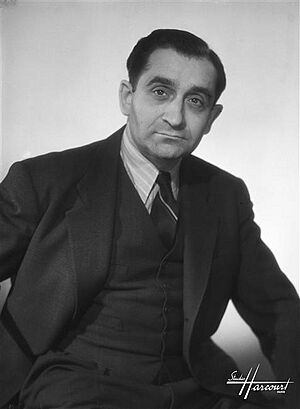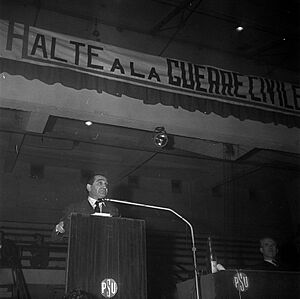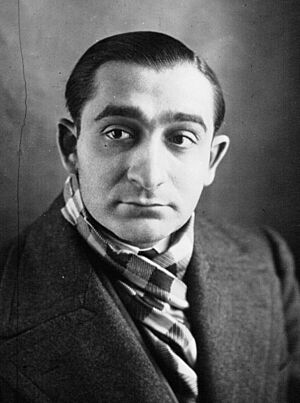Pierre Mendès France facts for kids
Quick facts for kids
Pierre Mendès France
|
|
|---|---|

Pierre Mendès France in 1948
|
|
| Prime Minister of France | |
| In office 18 June 1954 – 23 February 1955 |
|
| President | René Coty |
| Preceded by | Joseph Laniel |
| Succeeded by | Edgar Faure |
| Minister of Foreign Affairs | |
| In office 18 June 1954 – 20 January 1955 |
|
| Prime Minister | Himself |
| Preceded by | Georges Bidault |
| Succeeded by | Edgar Faure |
| Mayor of Louviers | |
| In office 13 March 1953 – 27 November 1958 |
|
| Preceded by | Marcel Malherbe |
| Succeeded by | André Vincelot |
| In office 17 May 1935 – 20 September 1939 |
|
| Preceded by | Raoul Thorel |
| Succeeded by | Auguste Fromentin |
| President of the General Council of Eure | |
| In office 6 October 1945 – 6 December 1958 |
|
| Preceded by | Office established |
| Succeeded by | Gustave Héon |
| Minister of National Economics | |
| In office 4 September 1944 – 6 April 1945 |
|
| Prime Minister | Charles de Gaulle |
| Preceded by | Office established |
| Succeeded by | René Pleven |
| Commissioner for Finances | |
| In office 3 November 1943 – 4 September 1944 |
|
| President | Charles de Gaulle |
| Preceded by | Maurice Couve de Murville |
| Succeeded by | Aimé Lepercq |
| Personal details | |
| Born |
Pierre Isaac Isidore Mendès France
11 January 1907 Paris, France |
| Died | 18 October 1982 (aged 75) Paris, France |
| Political party | Radical (1924–1959) Autonomous Socialist (1959–1960) Unified Socialist (1960–1971) |
| Spouses |
Lili Cicurel
(m. 1933; died 1967)Marie-Claire Servan-Shreiber de Fleurieu
(m. 1971) |
| Children | 2 |
| Alma mater | University of Paris |
Pierre Mendès France (born January 11, 1907 – died October 18, 1982) was an important French politician. He served as the Prime Minister of France for about eight months, from 1954 to 1955.
As a member of the Radical Party, he led a government supported by several different political groups. His main goal was to end the First Indochina War, a long and costly conflict for France. Many French people wanted the war to end. At the 1954 Geneva Conference, Mendès France made a deal to pull out all French forces. He is remembered as one of the most important leaders of the French Fourth Republic.
Contents
Early Life and Education
Pierre Mendès France was born in Paris, France, on January 11, 1907. His family had a long history in France, tracing back to Portuguese Jewish people who settled there in the 1500s.
He was a very bright student. He studied at the École des sciences politiques and the Faculty of Law of Paris. In 1926, at just 19 years old, he earned a doctorate in law. This made him the youngest member of the Paris bar association, a group for lawyers. In 1924, he joined the Radical Party, a political group that represented the center-left in France.
Political Career Before World War II
In 1932, Mendès France became a member of the Chamber of Deputies, which was like the French Parliament. He was the youngest person in the Assembly at the time. His skills were quickly noticed. In 1938, he became the Under Secretary of State for Finance in the government led by Léon Blum.
World War II and Provisional Government
When France surrendered to Nazi Germany during World War II, Mendès France tried to escape to French North Africa. However, he was arrested by the Vichy government, which was the French government that cooperated with Germany. He was accused of desertion and put in prison.
He managed to escape from prison and made his way to Britain. There, he joined the Free French forces led by Charles de Gaulle. These forces continued to fight against Germany. During the war, Mendès France even flew in bombing raids as part of the Free French Air Forces.
After Paris was freed in August 1944, de Gaulle appointed him as the Minister for National Economy in the new French government. He also represented France at an important meeting in 1944 called the United Nations Monetary and Financial Conference at Bretton Woods.
Mendès France believed the government should control wages and prices to stop inflation. However, the Finance Minister, René Pleven, preferred less government involvement in the economy. When de Gaulle agreed with Pleven, Mendès France resigned. Still, de Gaulle respected his abilities and gave him other important roles, like working with the International Bank for Reconstruction and Development.
Leading France in the Fourth Republic
After the war, France set up a new democratic system called the French Fourth Republic. In 1947, Mendès France was re-elected to the National Assembly. He tried to form a government in 1953 but couldn't get enough support.
By 1954, France was deeply involved in difficult conflicts in its colonies, especially the First Indochina War and the Algerian War of Independence. When French forces lost a major battle at Dien Bien Phu in June 1954, the government resigned. Mendès France then successfully formed a new government.
He quickly worked to end the war in Indochina. He negotiated with Ho Chi Minh, the Vietnamese Communist leader. He believed France had no choice but to leave Indochina completely. The Assembly supported his decision. However, some people were very upset and criticized him strongly for this.
Mendès France also worked towards independence for other French colonies. He reached an agreement with Habib Bourguiba for Tunisia to become independent by 1956. He also started talks with leaders in Morocco for France to withdraw from there. He believed in making concessions to nationalists in Algeria too.
He hoped his Radical Party could help modernize French politics. He supported closer cooperation among European countries and proposed big economic changes. He also wanted European countries to work together on defense.
His government fell in February 1955. In 1956, he served as a Minister again but resigned because he disagreed with how the government was handling the Algerian War. This disagreement also led him to resign as the leader of the Radical Party in 1957.
Political Life in the Fifth Republic

In May 1958, a crisis over Algeria led to the end of the Fourth Republic and the creation of a new system, the French Fifth Republic, with Charles de Gaulle in charge. Mendès France, like many on the French left, opposed de Gaulle's rise to power.
He led a group that was against de Gaulle, but he lost his seat in the Assembly in the November 1958 elections. He was later removed from the Radical Party because most of its members supported de Gaulle. In 1959, he joined a new group called the Autonomous Socialist Party.
In 1960, this party joined with others to form the Unified Socialist Party (PSU). He tried to get back into the National Assembly in 1962 but was not successful.
In 1967, he returned to the Assembly as a PSU member. However, he lost his seat again in the 1968 elections, which were a big win for de Gaulle's party. Mendès France showed support for the student protests that happened in France in May 1968. This was unusual for a politician of his age.
In 1969, when Gaston Defferre ran for president, he named Mendès France as his preferred Prime Minister if he won. They campaigned together, but Defferre only got a small percentage of the votes. When François Mitterrand formed a new Socialist Party in 1971, Mendès France supported him. He lived long enough to see Mitterrand elected president.
Political Roles and Achievements
Pierre Mendès France held many important positions throughout his career:
- He served as the President of the Council of Ministers (Prime Minister) from 1954 to 1955.
- He was also the Minister of Foreign Affairs during that time.
- He briefly served as Minister of State in 1956.
He was elected to the National Assembly of France for the Eure department multiple times between 1932 and 1958, and later for Isère from 1967 to 1968. He also served as the President of the General Council of Eure and as the Mayor of Louviers for several years.
Honours
National honours
- Commander of the Legion of Honour
- Croix de Guerre 1939–1945 (War Cross)
- Resistance Medal
Foreign honours
 Belgium: Grand Officer of the Order of Leopold (Belgium)
Belgium: Grand Officer of the Order of Leopold (Belgium) Morocco: Grand Cordon of the Order of Ouissam Alaouite
Morocco: Grand Cordon of the Order of Ouissam Alaouite Monaco: Gran Cross of the Order of Saint-Charles
Monaco: Gran Cross of the Order of Saint-Charles Tunisia: Grand Cordon of the Order of Glory (Tunisia)
Tunisia: Grand Cordon of the Order of Glory (Tunisia)
Images for kids
See also
 In Spanish: Pierre Mendès France para niños
In Spanish: Pierre Mendès France para niños
- Tristan Mendès France
 | John T. Biggers |
 | Thomas Blackshear |
 | Mark Bradford |
 | Beverly Buchanan |



